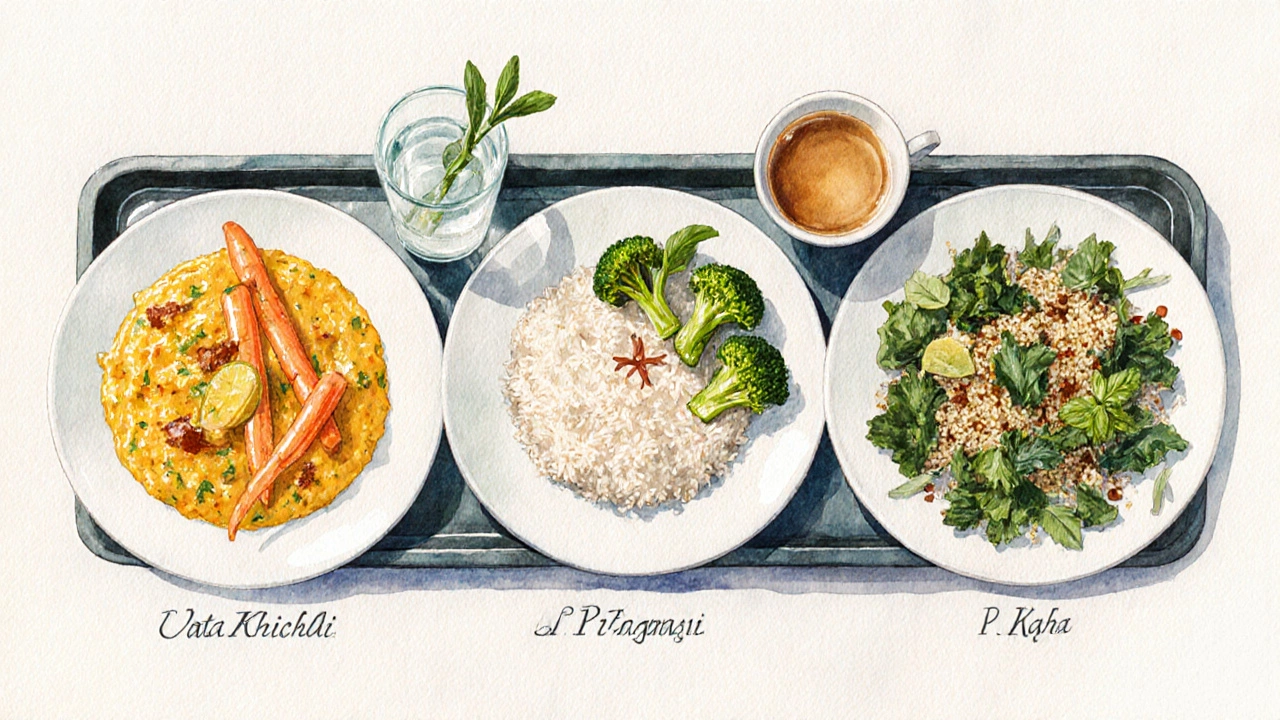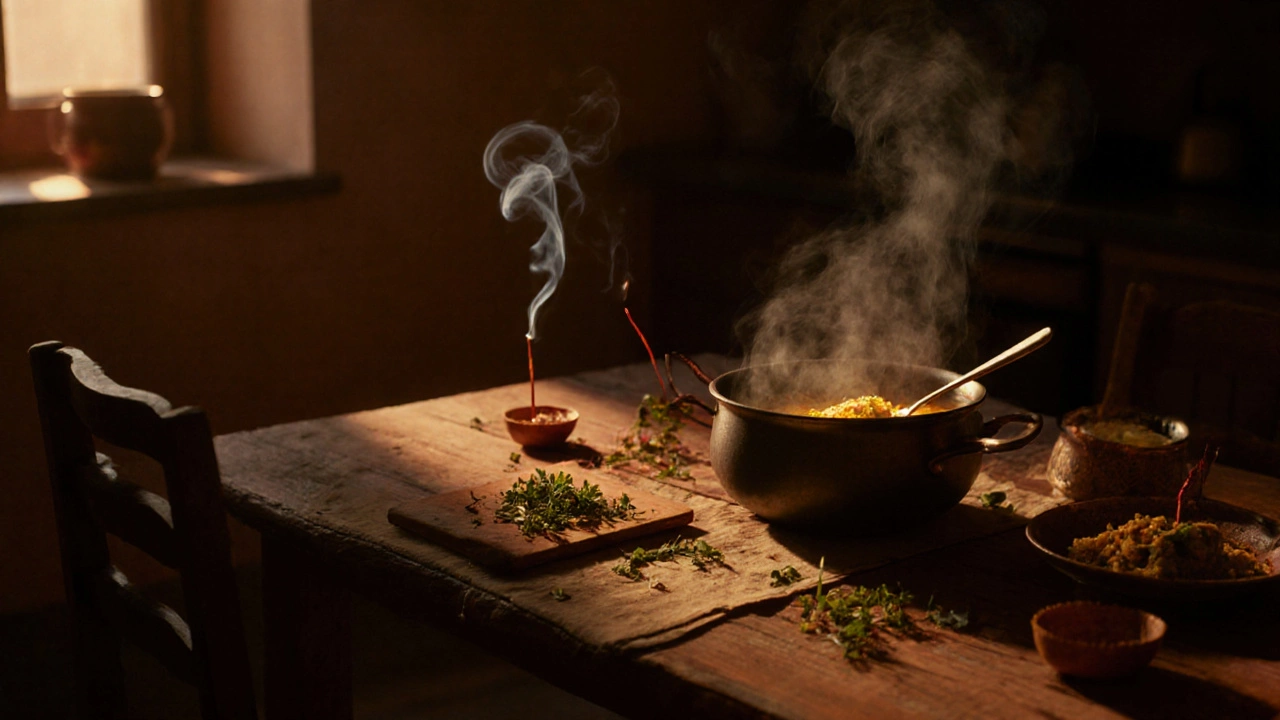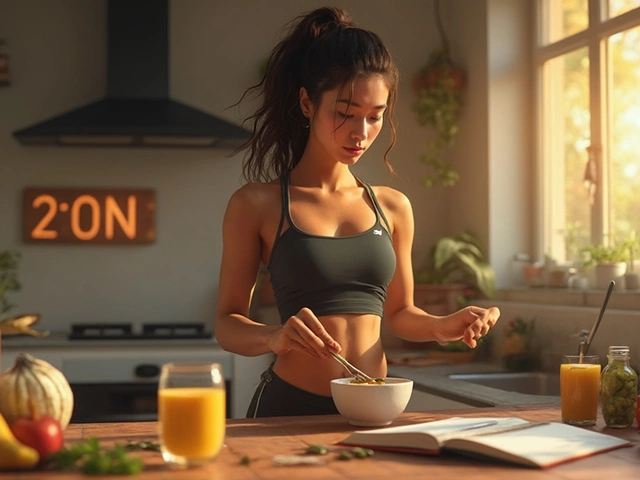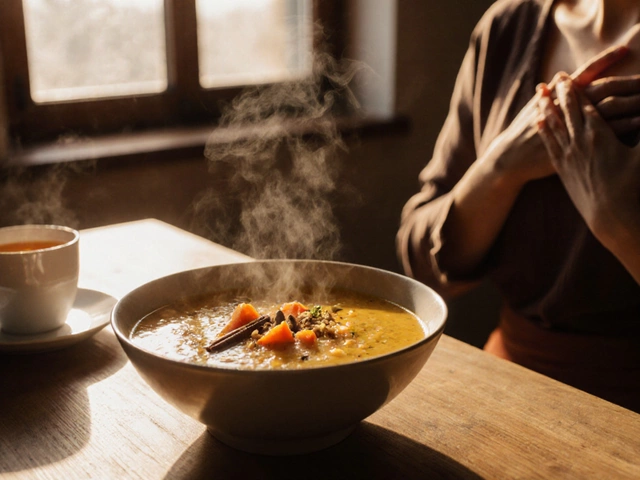Ayurvedic Dosha Dinner Calculator
Find Your Dominant Dosha
Answer these 4 quick questions to determine your Ayurvedic dosha type and get personalized dinner recommendations.
Your Ayurvedic Dosha
Vata Dinner Recommendations
Warm, moist, grounding foods that provide stability and calm.
- Ghee clarified butter (1 tbsp over vegetables)
- Mung beans or khichdi with ginger
- Steamed carrots and sweet root vegetables
- Warm spices: cinnamon, cardamom, turmeric
Pitta Dinner Recommendations
Cooling, soothing foods that reduce internal heat.
- Basmati rice with cumin
- Steamed broccoli or zucchini
- Coconut water as a drink
- Spices: coriander, fennel, mint
Kapha Dinner Recommendations
Light, dry, and mildly spicy foods to counteract heaviness.
- Quinoa with lemon
- Leafy greens with mustard seeds
- Ginger tea for digestion
- Spices: black pepper, cayenne, garlic
Practical Tips for All Doshas
- Finish dinner by 7 p.m. (Ayurvedic recommendation)
- Chew thoroughly (20+ times per bite)
- Use warm drinks instead of cold water
- Keep dinner light and easy to digest
When it comes to evening meals, Ayurveda is a traditional Indian system of medicine that uses diet, herbs, and lifestyle to balance the body’s energies offers clear guidance on what makes a Ayurvedic dinner nourishing and dosha‑friendly.
Understanding the Dosha Trio
In Ayurveda, the body is governed by three Dosha fundamental bio‑energies that dictate how we digest, think, and feel: Vata, Pitta, and Kapha. Each dosha has its own set of preferred foods, especially for the evening when digestion naturally slows down.
Why Dinner Timing Matters
Eating too late or having a heavy meal after sunset can disturb Agni the digestive fire that fuels metabolism. Ayurveda recommends finishing the main meal by 7 p.m. and keeping the dinner light, warm, and easy to digest.
Vata‑Balancing Dinner
Vata, the air‑earth element, thrives on warmth, moisture, and grounding foods. A Vata‑friendly dinner should be cooked, oily, and slightly sweet.
- Ghee clarified butter that adds lubricating fat - a tablespoon drizzled over vegetables.
- Mung beans light protein that is easy on the gut - simple khichdi with ginger.
- Steamed carrots sweet root vegetables that calm Vata.
- Warm spices like cinnamon, cardamom, and a pinch of Turmeric anti‑inflammatory golden spice.
Pitta‑Balancing Dinner
Pitta, the fire‑water element, needs cooling, less oily, and slightly bitter foods. Keep the meal light, avoiding excess heat.
- Basmati rice long‑grain rice that is less heating than other grains - served with a dash of cumin.
- Steamed broccoli cooling cruciferous veggie or zucchini.
- Coconut water natural electrolyte that cools the system as a drink.
- Spices like coriander, fennel, and a touch of Mint refreshing herb that reduces heat.

Kapha‑Balancing Dinner
Kapha, the earth‑water element, prefers light, dry, and mildly spicy foods to counter its natural heaviness.
- Quinoa high‑protein grain that is light and dry - tossed with lemon.
- Leafy greens like kale or spinach, cooked with mustard seeds. \n
- Ginger tea stimulates digestion and cuts Kapha’s sluggishness.
- Spices such as black pepper, cayenne, and a pinch of Garlic metabolism‑boosting aromatics.
Sample One‑Week Dinner Plan
| Day | Vata | Pitta | Kapha |
|---|---|---|---|
| Monday | Kitchdi with mung beans, ghee, and ginger | Basmati rice, steamed broccoli, coconut water | Quinoa salad with kale, lemon, and cayenne |
| Tuesday | Warm carrot soup with cumin | Cucumber‑mint raita with rice | Stir‑fried vegetables with mustard seeds |
| Wednesday | Sweet potato mash, ghee, and turmeric | Steamed zucchini, coriander‑lime quinoa | Spiced lentil soup with ginger |
| Thursday | Moong dal with brown rice and fennel | Rice with sautéed spinach and mint | Quinoa pilaf with carrots and black pepper |
| Friday | Barley porridge with cinnamon and dates | Rice, steamed asparagus, coriander chutney | Mixed greens salad with garlic‑ginger dressing |
| Saturday | Rice pudding made with almond milk and cardamom | Cool cucumber soup with dill | Grilled paneer with rosemary and pepper |
| Sunday | Steamed carrots, beetroot, and a dash of ghee | Steamed cauliflower, cumin‑seed rice | Millet khichdi with mustard seeds |
Practical Tips for Every Evening Meal
- Eat seated, not while walking or working.
- Chew each bite at least 20 times to aid Digestion the process of breaking down food.
- Avoid cold drinks; opt for warm herbal tea.
- Keep the dining area warm and inviting - a candle or soft light helps calm Vata.
- Finish eating when you feel about 75% full; excess weight can aggravate Kapha.

Common Mistakes to Watch Out For
Even if you’re trying to follow Ayurvedic principles, a few habits can undo your effort:
- Late‑night snacking after 9 p.m. - the digestive fire is already low.
- Choosing raw salads for a Vata dinner - raw foods are too dry and can increase gas.
- Over‑spicing a Pitta meal - too many hot spices raise internal heat.
- Serving heavy dairy desserts to Kapha - dairy is grounding and can lead to congestion.
Integrating Yoga and Breath Work
Complement your dinner with a short Yoga gentle poses that stimulate digestion and calm the mind routine:
- Marjaryasana (Cat‑Cow) - 5 rounds.
- Apanasana (Knees‑to‑Chest) - hold for 1 minute.
- Pranayama: Nadi Shodhana (Alternate Nostril Breath) - 3 minutes.
These moves help settle the stomach and balance the doshas before bedtime.
Mini‑FAQ
Can I mix foods from different dosha recommendations in one dinner?
Yes, as long as the overall plate leans toward the qualities that calm your dominant dosha. A small amount of cooling cucumber can be added to a Vata‑friendly khichdi without causing imbalance.
What if I’m unsure of my dosha type?
Take a simple online quiz or consult an Ayurvedic practitioner. Most people have a primary dosha with secondary traits; start with the primary recommendations and adjust based on how you feel.
Is it okay to have fruit after dinner?
Fresh fruit is generally too cold and can dampen Agni. If you crave sweetness, opt for a warm cooked apple with a sprinkle of cinnamon, especially for Vata.
How much protein should I include in my evening meal?
Aim for a palm‑size portion of plant‑based protein (mung beans, lentils, quinoa) or a small serving of dairy for Kapha. Vata benefits from a bit more protein to stay grounded, while Pitta prefers lighter protein sources.
Can I drink water with my dinner?
Sip warm water or herbal tea throughout the meal. Cold water can suppress digestive fire, especially for Vata and Pitta.
Next Steps
Pick the dosha that feels most like you, try one of the sample dinners this week, and notice how your sleep, energy, and digestion change. Adjust spices or portions based on the feedback your body gives you - that’s the core of Ayurvedic living.






